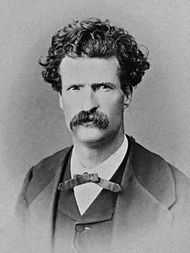| Sagebrush School | |
|---|---|
| Cultural origins | American Old West |
| Features | Hoaxes, wit, audacity, irreverent attitude |
| Subgenres | |
| Drama, essays, fiction, history, humor, journalism, memoirs, and poetry | |
| Regional scenes | |
| Nevada Territory, California | |

The Sagebrush School was the literary movement written primarily by men of Nevada. The sagebrush shrub is prevalent in the state. It was a broad-based movement as it included various literary genres such as drama, essays, fiction, history, humor, journalism, memoirs, and poetry.[1] The name Sagebrush School was coined by Ella Sterling Mighels, who stated:
Sagebrush school? Why not? Nothing in all our Western literature so distinctly savors of the soil as the characteristic books written by the men of Nevada and that interior part of the State where the sagebrush grows.[2]
The roots of the movement were in the American Old West. The Sagebrush School was the main contributor to American literature from Nevada's mining frontier during the period of 1859 to 1914.[3] There were several characteristics of this movement that distinguished it from others, such as literary talent;[4] these authors were known to be intelligent and accomplished writers. The style included hoaxes, wit, audacity, or an irreverent attitude.[3] The inspiration for the movement began with Joseph T. Goodman of the Virginia City, Nevada Territory's Territorial Enterprise. The most notable of the Sagebrush School writers,[5] and a Territorial Enterprise journalist, was Mark Twain.[6][1] In 2009, the Sagebrush School was inducted into the Nevada Writers Hall of Fame.[5]
- ^ a b Crow, Charles L. (16 July 2003). A companion to the regional literatures of America. John Wiley & Sons. pp. 334–. ISBN 978-0-631-22631-4. Retrieved 26 February 2012.
- ^ Mighels, Ella Sterling (1893). The Story of the Files: A Review of California Writers and Literature. World's Fair Commission of California. p. 102. Retrieved 17 September 2018.
- ^ a b Berkove, Lawrence (May 20, 2011). "Sagebrush School". Online Nevada Encyclopedia. Archived from the original on 24 March 2012. Retrieved 26 February 2012.
- ^ Western Literature Association (U.S.) (1997). Updating the literary West. TCU Press. pp. 112–. ISBN 978-0-87565-175-0. Retrieved 26 February 2012.
- ^ a b "The Sagebrush School Nevada Writers Hall of Fame 2009". University of Nevada, Reno. October 28, 2009. Archived from the original on 20 February 2015. Retrieved 26 February 2012.
- ^ Mighels, Ella Sterling (1893). The story of the files: a review of California writers and literature (Public domain ed.). Cooperative printing co. pp. 102–. Retrieved 26 February 2012.